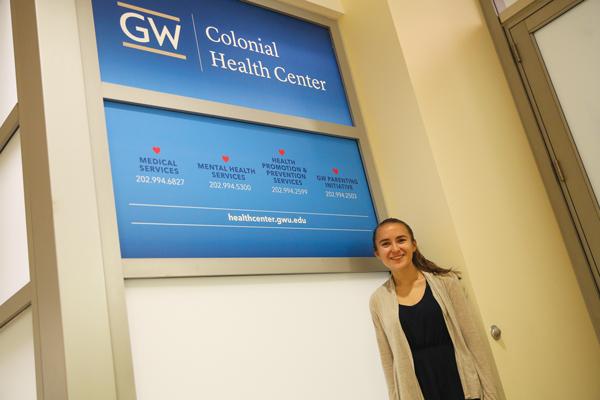Updated: Sept. 6, 2016 at 12:12 p.m.
GW’s first peer support hotline could be delayed by as much as a semester.
The program, titled GW Listens, was set to launch this fall, but students are facing obstacles after a top administrator working with the program was laid off in May. Student leaders said because of budget cuts in the Division of Student Affairs and a lack of a location for the program, the call line will not open until at least after Thanksgiving.
Mark Levine, the former senior associate dean of students, had worked with student leaders to develop the call line since 2015. His position was eliminated when officials cut about 40 staff positions as part of this year’s 3 to 5 percent budget cuts to the University’s central offices.
Peter Konwerski, the vice provost and dean of student affairs, said Amber Cargill, the assistant director of training and education and a clinician in Mental Health Services, continues to work with the Student Association on launching the program.
“The Division of Student Affairs continues to support the GW Student Association as they continue to move forward and launch this program,” Konwerski said. “The Student Association will have more specifics as they finalize the program’s format.”
Konwerski declined to comment on whether the launch date for GW Listens was set back after Levine’s departure and deferred questions about details on the program to student leaders, who are spearheading the program.
Erika Feinman, the president of the Student Association, said they are hesitant to set a specific launch date for the hotline. Nick Gumas, a former Student Association president, first proposed the hotline in 2014 when mental health concerns grew on campus after a string of suicides that year. SA leaders have been involved in the project since.
“When the University unfortunately lost Mark Levine, that was a big setback for this project because he really was the main advocate for this project,” Feinman said.
The University officially gave GW Listens a phone number and a phone, but officials have not yet found an office for the hotline, Feinman said. They said officials are considering using space on the fourth floor of the Marvin Center but are still weighing other options.
Feinman said a group of trained students is ready to operate the call line, but there is no plan set to continue training volunteers. Feinman said that they will not launch GW Listens until it is “100 percent ready.”
“The main issue right now is that we have a great group of students that are trained and ready to go, but we don’t currently have anything implemented for how to train future volunteers,” Feinman said. “We don’t want to launch it until we have a plan in place to ensure that this will continue in the future.”
The SA executive cabinet reviewed about 100 applications for the positions and selected 20 students to staff the hotline last year. The 20 student volunteers completed a weekly training course run by Mental Health Services, the Colonial Health Center and academic departments.
The program’s former student leader said last semester that the trainings totaled two and a half hours per week and gave volunteers a range of scenarios they could encounter, from students who feel academically overwhelmed to those facing depression.
Anastasiya Parvankin, a sophomore and the student director of GW Listens, said in an email that students will continue the trainings over the next few months and that she plans for volunteers to be ready by the week after Thanksgiving. Once volunteers are completely trained, Parvankin said she hopes to start the program as early as the week after Thanksgiving, but that date could be delayed if they still don’t have a space for the hotline.
“We are doing final training with volunteers, figuring out last details regarding the launch and will soon be sending out applications for new volunteers for next year,” Parvankin said.
The application for next year’s volunteers will open this October, and the program plans to select about 20 additional volunteers, Parvankin said.
Volunteers will be required to take a class in the spring before joining the hotline next fall. Next semester’s class will be limited to hotline volunteers, while last year’s was required for volunteers but open to other students.
“Additional training after the course ends will not be necessary due to a lot of class improvements,” she said but did not provide details on those improvements.
Parvankin said that she is planning to open the call line from Sunday to Wednesday from the hours of 9 p.m. to 1 a.m.
She added that she hopes to grow the program after they recruit more student volunteers.
“Once we have more volunteers, we will be able to expand the program,” Parvankin said. “I believe talking to peers can sometimes be much easier than talking to adults, and I think the anonymous, confidential aspect of it also draws students in.”
Elise Zaidi contributed reporting.








